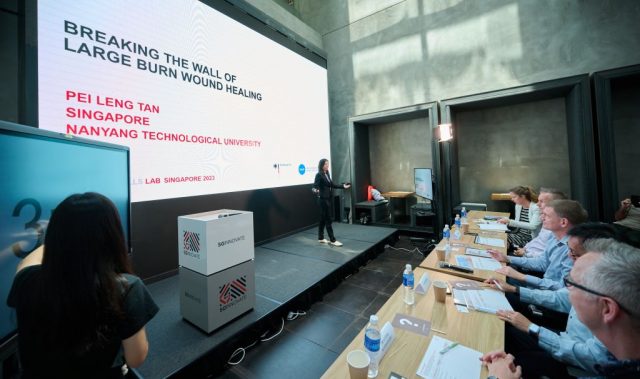
AsianScientist (Feb. 17, 2015) – Nanyang Technological University (NTU) is collaborating with Thales Alenia Space and Thales teams in Singapore, Europe’s largest satellite manufacturer and the only Thales corporate research center in Asia respectively.
The partnership aims to leverage the rapidly growing nanosatellite and microsatellite segments of the global satellite industry which usually refers to satellites less than 100 kg. The partners will set up a joint research laboratory in NTU named S4TIN, short for Smart Small Satellite Systems – Thales in NTU.
Several joint projects have been identified. The first is to develop small and robust infrared cameras that are able to detect changes in the climate from space. Another proposed joint research program is to study the use of satellite technology for maritime security.
The S4TIN joint lab was launched today by Mr. Yeoh Keat Chuan, Managing Director of Singapore Economic Development Board, NTU Provost Professor Freddy Boey, Thales Alenia Space’s Chief Technical Officer Mr. Patrick Maute and Thales in Singapore’s Chief Executive Officer Mr Jean-Noel Stock.
“We have successfully built, launched and operated four satellites in space for the last five years. Satellite research and development is extremely demanding and highly multidisciplinary and to put even one in space is no small task,” Boey said.
“Together with Thales, we now aim to develop more advanced satellite technology to bring the world better telecommunications and more accurate climate sensing and observation data. This is also the more sustainable route, as smaller satellites require less resources and time to build, launch and operate.”
“Thales had years of successful collaboration with NTU through Thales Research & Technology Singapore,” said Maute. “With the opening of S4TIN joint lab and the setting up of Space CoE, we are confident that the Thales team in Singapore will play an active role for future joint projects with NTU and strengthen the connections between Thales Alenia Space and the Singapore space community.”
S4TIN will be co-directed by Associate Professor Low Kay Soon, center director of NTU’s Satellite Research Center; Mr. Jose-Maria Gonzalez Asenjo from Thales Alenia Space, who is assisted by Dr. Erick Lansard, CTO & Vice President Space Development from Thales in Singapore. Landsard is also the Director of Thales Research & Technology Singapore’s Space Center of Excellence, whose engineers will be working at the new joint lab.
These Thales engineers will contribute their expertise in RF transceivers, photonics, sensor signal processing and complex system simulation. The Space Center of Excellence aims to further develop competency in mission analysis and simulation, and satellite engineering, as well as facilitate the translation of research outcomes into future products.
The new joint lab will leverage the NTU Satellite Research Center which has more than 40 researchers, staff and students. It is also expected to benefit from the interaction and synergy offered by NTU’s faculty, researchers and engineering schools.
As a demonstration of its commitment for world-class satellite research facilities, NTU also today officially launched its Satellite Research Center II, which houses state-of-the-art satellite communications and research equipment.
NTU is now building VELOX-CI, Singapore’s first climate satellite and VELOX-II, an experimental communication satellite, both of which are in their advanced stage of development. This will bring the total number of NTU-made satellites in space to six, in addition to the four already orbiting Earth.
—–
Source: Nanyang Technological University.
Disclaimer: This article does not necessarily reflect the views of AsianScientist or its staff.












